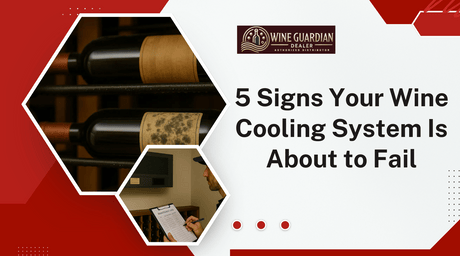
5 Signs Your Wine Cooling System Is About to Fail
Don’t wait for a costly surprise. Wine Guardian Dealer breaks down the top 5 signs your wine cooling system may be failing — and how to fix it before damage...
Jim Hopper
In Stock & Ready to Ship – Order Your Wine Cooling System Today!
Free Wine Cellar Expert Consultation | 📞 Call 1-800-260-1712
Start with a free expert consult—cooling system sizing, racking options, and no upsells.

Build your dream wine cellar—without costly mistakes or guesswork.
By Jim Hopper, Wine Cooling Expert
Proper wine cellar climate control is crucial for preserving the taste, structure, and longevity of your wine collection. Temperature fluctuations and poor humidity control can lead to wine spoilage, oxidation, and loss of investment value.
An insulated wine cellar is essential to maintain stable temperature and humidity levels, preventing the space from becoming too warm or too cold. Without proper insulation, even the most advanced cooling system will struggle to perform efficiently — and your wine could suffer as a result.
For serious wine collectors, ensuring the right wine storage conditions is non-negotiable. This is where Wine Guardian cooling solutions come in — offering reliable temperature and humidity management to help you store wine under optimal conditions year-round.
To learn more about long-term protection, storage best practices, and recommended equipment, visit our full Wine Aging and Preservation: Protecting Your Collection for the Next 30 Years.

The ideal wine storage temperature falls between 55°F and 58°F, with humidity control set between 50% and 70%. This prevents cork shrinkage, excessive evaporation, and mold growth. Research has shown the importance of maintaining these specific temperature and humidity levels to preserve wine quality.
Too warm (above 70°F): Accelerates aging and alters wine taste.
Too cold (below 50°F): Slows aging and may freeze wine bottles, pushing corks out.
High humidity: Causes mold growth and damages labels.
Low humidity: Leads to cork shrinkage, allowing air to enter and spoil wine.
Full-bodied red wines: Should be stored at room temperature to avoid a thin and harsh taste.
A high-quality wine cooling system ensures stable cellar temperature and humidity control, preventing the risks of spoilage.
Self-contained cooling units: Best for small wine cellars, easy to install.
Ducted cooling systems: Hidden cooling for a seamless wine storage area.
Split cooling systems: Advanced temperature and humidity control, ideal for larger wine cellars.
Starting prices for these wine cooling systems vary, helping potential customers understand the initial investment required for different wine storage solutions.
Investing in a Wine Guardian wine cooling system ensures that your wine collection matures properly in optimal conditions.
Ignoring wine cellar climate control can result in:
Oxidation: Fluctuating temperatures cause premature aging.
Label damage & mold growth: High humidity affects wine bottles.
Cork failure: Poor humidity control leads to air exposure, spoiling stored wine.

When selecting a wine cooling system, consider:
Cellar size – Larger wine cellars require stronger cooling.
Insulation & vapor barriers – Enhance cooling unit efficiency. Having an insulated wine cellar ensures stable temperatures, making the cooling unit more effective.
Energy-efficient units – Reduce operating costs.
Wine Guardian cooling units offer cutting-edge technology for long-term storage, ensuring stable cellar temperature and wine storage conditions.
To enhance humidity control and ensure ideal wine storage conditions, consider:
Humidifiers – Maintain proper humidity levels.
Temperature monitoring sensors – Smart tracking for wine cellar temperature fluctuations.
Vapor barriers – Prevent condensation and insulation issues.
Additionally, using the right type of glass can minimize light exposure and maintain wine quality.
Schedule routine maintenance of your wine cooling system.
Use temperature and humidity sensors for real-time monitoring.
Keep bottles stored horizontally to protect cork integrity.
Ensure proper ventilation to prevent mold growth.
Conduct research to stay informed about the best practices for maintaining ideal wine storage conditions.

At Wine Guardian Dealer, we specialize in premium wine cooling systems, designed to provide optimal wine storage conditions for wine collectors and enthusiasts. Our cooling systems are made in the USA, ensuring reliability and superior craftsmanship.
Authorized Wine Guardian Dealer – Genuine, manufacturer-backed products.
Expert Consultation – Tailored recommendations for your wine cellar.
Fast Shipping – Secure and timely delivery of your cooling unit.
Customer Satisfaction Guarantee – Reliable support and high-quality wine cooling solutions.
When you choose Wine Guardian Dealer, you invest in long-term wine preservation, ensuring your wine collection ages flawlessly.
To improve reader experience and SEO performance:
Infographics & charts – Illustrating wine storage conditions. Consider including infographics or charts that highlight research findings on the impact of temperature and humidity on wine quality.
Comparison tables – Showcasing various wine cooling units.
Investing in a wine cooling system ensures that your wine collection ages perfectly. Wine Guardian solutions provide the best wine cellar climate control, safeguarding stored wine against temperature variations and humidity issues.
A wine cooling system regulates cellar temperature, keeping it within the ideal range. Having an insulated wine cellar helps maintain the ideal temperature more effectively.
Yes! Humidity control prevents cork shrinkage, mold, and evaporation. An insulated wine cellar helps maintain proper humidity levels.
The ideal wine storage temperature is 55°F–58°F, ensuring proper wine aging. Research has shown that maintaining the ideal temperature range is crucial for proper wine aging.
🛒Shop our most-loved Wine Guardian cooling systems today.
🛠️Protect your wine with the most trusted systems on the market.
❤️Tested, reviewed, and loved by serious collectors like you.